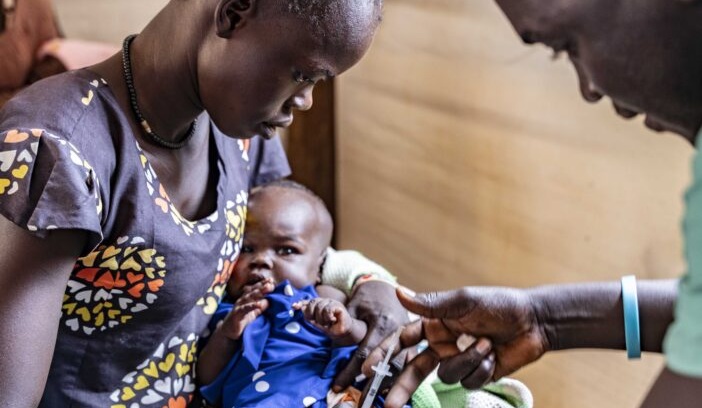In Sudan, once a glimmer of hope stood in childhood immunization, over 90 percent of young children were routinely vaccinated as recently as 2022.
Today, that figure has plummeted to just 48 percent, the lowest in the world, as conflict and instability ravage the country’s fragile health system.
This steep decline leaves countless children dangerously exposed to preventable illnesses.
UN agencies describe Sudan’s conflict as the largest humanitarian crisis on record.
The civil war, now in its second year, has killed tens of thousands and uprooted millions.
One year ago, nearly 838,000 children in Sudan received no vaccinations at all, only Nigeria and India recorded higher zero-dose totals globally.
A critical indicator of immunisation access, the first dose of the DTP vaccine (for diphtheria, tetanus and pertussis), is now absent for many Sudanese children, signalling minimal to no contact with health services.
Dr Tedbabe Degefie Hailegebriel, UNICEF’s health chief in Sudan, confirms that unlike many regions where anti-vaccine sentiment plays a role, in Sudan the decline stems squarely from the turmoil of war.
“The war has destroyed health infrastructure, severed supply chains and shattered information systems,” she explains.
“Health workers – doctors, nurses, midwives, community volunteers – haven’t been paid in months.
“Basic essentials like clean water and electricity at clinics are gone.”
Thousands of displaced families now find shelter in camps or makeshift accommodation.
There, overcrowding, poor sanitation and disrupted healthcare combine with low immunization coverage to fuel outbreaks of diseases like measles, illnesses that can be fatal or lead to lifelong disabilities.
“These children are robbed of their future,” Hailegebriel warns.
Globally, UNICEF and WHO report that children living in fragile states, especially those under humanitarian duress, are three times more likely to lack vaccination than peers in stable countries.
The slowdown in immunisation progress is not limited to conflict zones.
WHO’s immunisation department head, Dr Kate O’Brien, cautions that even small declines in coverage can provoke outbreaks and tip strained health systems toward collapse.
She adds that misinformation is a growing concern and may further hinder vaccine efforts if left unchecked.
Despite the collapse, humanitarian agencies have briefly reversed the downward trend in early 2025 through targeted vaccination campaigns.
UNICEF has also shipped refrigerated containers to rebuild the “cold chain,” the vital network ensuring vaccines remain potent during transport and storage.
But such efforts face constant disruption: when fighting flares, aid delivery grinds to a halt, and health workers face the daunting task of rebuilding in newly accessible regions.
Hailegebriel recounts, “Every time a new area opens up, we must reconstruct clinics, replace stolen supplies and restore fragile systems before collapse.”
Sudanese officials, including Prime Minister Mohammed Shia al‑Sudani, have launched a formal probe to identify failures and negligence amid the crisis.
Austerity in government income and uncertainty over foreign aid funding also threatens future vaccination commitments.
Without funding, Dr O’Brien warns, countries struggling to mobilize local resources will see widening gaps in coverage.
Meanwhile, community leaders like Abdallah Idriss Abugarda of the Darfur Diaspora in the UK highlight how daily survival demands overshadow public health.
In places like besieged El Fasher, parents worry more about securing food and malaria treatment than taking their child for a vaccine.
“Vaccination isn’t their priority,” Abugarda says.
“Families need medicine just to keep their children alive, to treat fevers or malaria.”
As Sudan’s children face rising threats from preventable disease, observers stress the need for global attention and immediate action.
“Sudan’s plight has not received the attention it desperately deserves,” Hailegebriel insists.
“We hope this changes, and that hostilities finally cease, so children can live in peace and thrive.”
In a nation where health services collapse under conflict, vaccine-preventable illnesses pose more danger than bombs.
With dwindling resources and chronic insecurity, Sudan stands at a perilous crossroad: one that determines whether aid, infrastructure restoration and peace can avert the loss of a generation.







